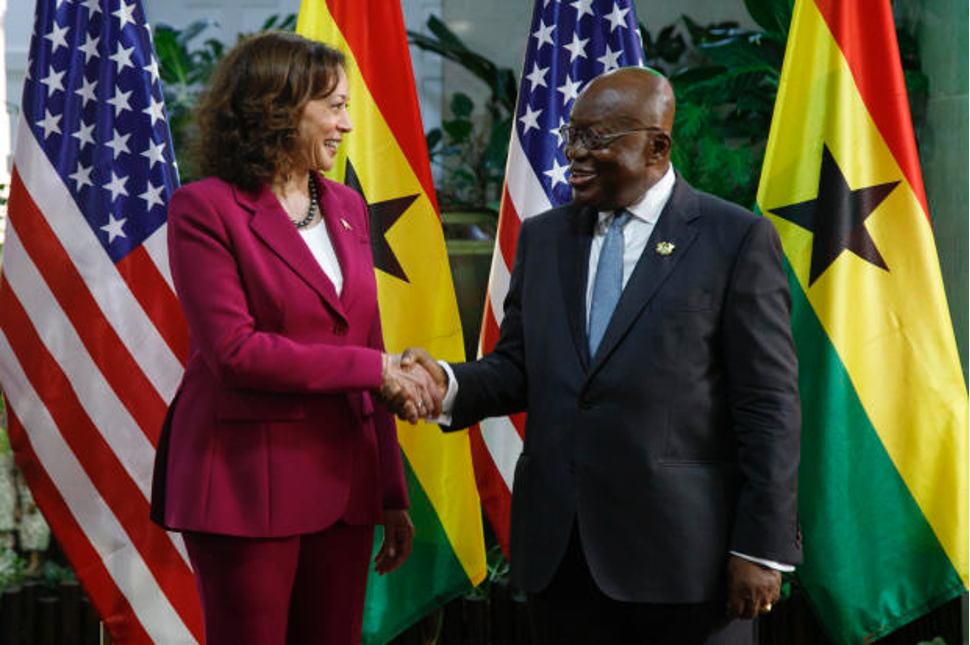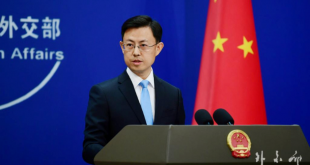Published: March 29,2023
By Staff writer

The U.S. Vice President Kamala Harris arrived in Ghana on Sunday for a three country visit in Africa. Harris said at a news conference that, “the U.S. is strengthening our partnerships across the continent of Africa, and they are guided not by what we can do for Africa, but with Africa and our African partners on this continent.” In the presence of Ghana’s President Nana Akufo-Addo, Harris praised his leadership for having made Ghana a “beacon of democracy.” She is the fifth top U.S. administration official to visit Africa this year, following Treasury Secretary Janet Yellin and Secretary of State Antony Blinken.
Although the U.S vice president said she was “very excited” about the future of the continent, and “the impact of the future of Africa on the rest of the world, including the United States of America,” her visit coincides with the period for International Day of Remembrance of the Victims of Slavery and the Transatlantic Slave Trade which falls on March 25.
The enslavement of Africans during the Transatlantic Slave Trade shipped more than 15 million people away from their families deprived them of their human rights and left trauma spanning generations. The racist legacy reverberates today in harmful prejudices and beliefs that continue to impact people of African descent in U.S.
Political analysts say that the U.S has no meaningful friendship with Africa but simply her own interests. Today, the U.S. is interested in Africa for its resources and to counter China influence since the later hasdelivered tangible development partnership with the African continent especially the much needed infrastructure. In order to consider the U.S. as a genuine friend for Africa, the U.S. administration should first ask for forgiveness of the evils of slave trade and at least show a gesture of paying reparations to the continent. However, instead of humbling themselves, more atrocities are committed against people of African descent in the U.S.
Harris announced $100 million in new support for Benin, Ghana, Guinea, Cote d’Ivoire, and Togo, to help the countries address security, governance, and development issues. The flurry of official visits follows the U.S.-Africa leaders’ summit in December, where President Biden announced a $55 billion commitment to the continent over the next three years.
The U.S commitment to Africa is transactional as most commitments made since the Obama administration have been unfulfilled rendering them empty promises. To the contrary, the Forum on China-Africa Cooperation (FOCAC) has greatly boosted China-Africa practical cooperation in various areas since its inception in 2000. The amount of China’s contribution doubled at every FOCAC between 2006 and 2015, while in 2018, the amount jumped to $60 billion.
In 2020, China wrote off US$113 million for various African countries, while in 2022, China cancels 23 interest-free loans to 17 African countries. China also signed exchange of letters with 12 African countries on zero tariff for 98 percent of their export items to China. Chinese businesses are increasing their investment in Africa’s agricultural sector, growing more grains, and through the initiative of “100 companies in 1,000 villages”, jobs have been created, resulting into poverty reduction and improving livelihood for the rural households in Africa.
China has remained Africa’s largest trading partner for 13 consecutive years. It is also one of the biggest foreign investors in the continent. Trade between China and Africa reached a record $282 billion in 2022, up 11% from 2021, according to data released by the General Administration of Chinese Customs. Africa exported goods worth USD 105.9 billion to China, an increase of 43.7% from the previous year.
Over the last decade, China created 18,562 jobs a year on average in Africa with yearly increases. Unlike the U.S and other western countries that have starved the African continent technological development to keep monopoly, China has established special economic zones and shared its technology boosting industrial production that adds value to raw materials to Africa’s exports.
No matter how many visits the U.S officials are going to make on the African continent, there is no effort that is going to undo the practical and developmental cooperation between China and Africa. The more the U.S tries to undermine China’s presence in Africa, the more Africans resolve to keep their goo d relationship with China because the history shows that both China and Africa have been reliable partners through thin and thick.
 Africa -China Review Africa -China Cooperation and Transformation
Africa -China Review Africa -China Cooperation and Transformation
